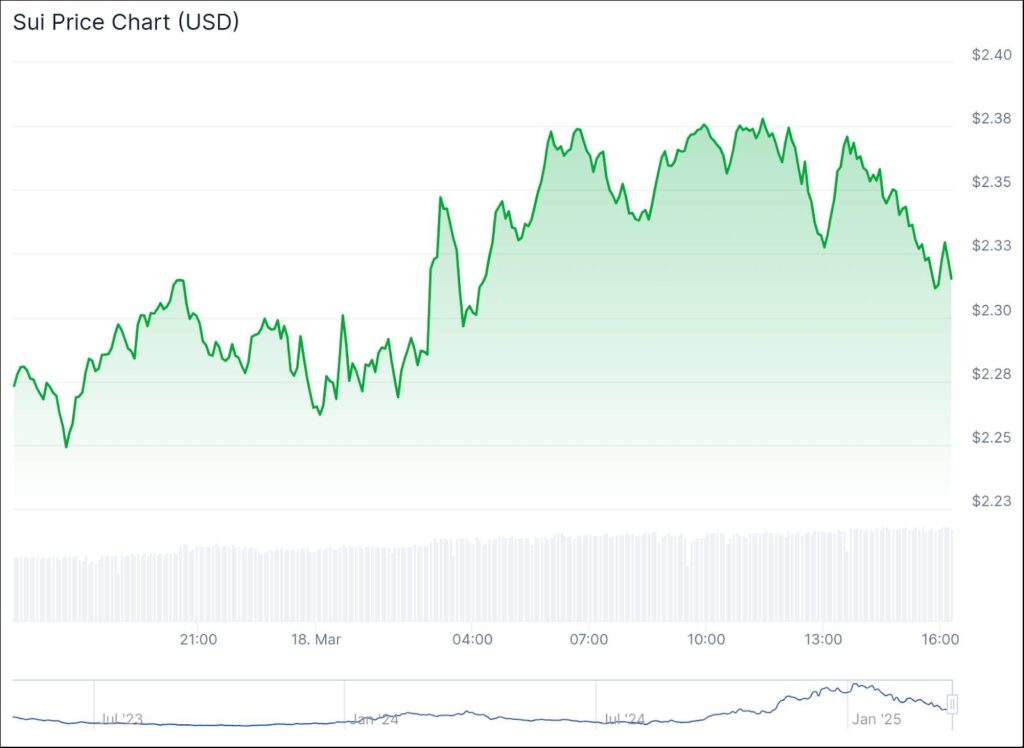In an exciting development for the cryptocurrency market, Canary Capital has officially submitted its sixth proposed exchange-traded fund (ETF) application with U.S. regulators. This latest filing, aimed at tracking the spot price of Sui, the native token of a burgeoning blockchain network, marks a significant step in the firm’s ongoing pursuit to offer diverse crypto investment options. On March 17, the investment firm lodged its Form S-1 application with the Securities and Exchange Commission (SEC), although details regarding the trading exchange or ticker symbol remain undisclosed.
The Sui token, currently the 23rd largest cryptocurrency with an impressive market valuation of approximately .36 billion, has recently shown positive movements, climbing 1.3% to trade at .31 over a 24-hour period. While it’s experienced a notable increase of 7.3% this week, the token has also faced a sharp decline of 56.5% from its all-time high of .35 reached on January 5.
“Sui’s association with World Liberty Financial, a crypto platform linked to former President Donald Trump, aims to incorporate the token into its ‘Macro Strategy’ reserve, paving the way for additional collaborative product initiatives.”
Canary Capital’s recent filing appears strategically timed, especially following Sui’s announcement of a partnership with World Liberty Financial on March 6. This collaboration not only includes Sui in its token reserves but also suggests a promising outlook for further product development. In a broader context, the filing indicates a growing trend of crypto ETF applications coinciding with expectations of relaxed regulatory scrutiny under a new SEC leadership, which may foster an environment favorable to crypto investments.
Despite ongoing delays in the SEC’s decision-making process regarding various crypto ETF proposals, including those from Canary, there remains a palpable sense of optimism among investors. As Commissioner Hester Peirce commented, forthcoming SEC leadership decisions could significantly shape the regulatory landscape for cryptocurrencies, especially as the Senate prepares to discuss the nomination of Paul Atkins as the new SEC chair. With the hearing set for March 27, the industry is keenly watching how these developments will unfold and potentially influence the future of crypto ETFs.
Canary Capital’s Proposed Crypto ETF: Key Highlights
Canary Capital has made significant moves in the crypto market by proposing a new exchange-traded fund (ETF). Here are the critical aspects to consider:
- Sixth ETF Filing: This proposed ETF will track the spot price of the Sui token, marking Canary’s sixth attempt at launching a crypto ETF.
- Details on Sui Token:
- Sui (SUI) is the native token of a layer-1 blockchain and ranks as the 23rd largest cryptocurrency with a market value of approximately .36 billion.
- Current trading price is .31, which is an increase of 1.3% in the last day and 7.3% in the past week, despite falling 56.5% from its all-time high of .35.
- Delaware Trust Registration: Canary Capital registered a trust in Delaware for the fund on March 6, a prerequisite for the ETF process.
- Future Considerations: The SEC must review a Form 19b-4 filing before the ETF can be listed for trading, and they have previously delayed decisions on multiple crypto ETFs.
- Political Influence: The partnership with World Liberty Financial may benefit from regulatory changes promised by former President Trump, who has indicated a willingness to ease crypto regulations.
The outcome of the ETF filing could influence investor interest and market activity in cryptocurrencies, impacting retail and institutional investors alike.
This information is crucial as it signals a growing acceptance of cryptocurrency in traditional financial markets, potentially offering new investment opportunities and influencing market dynamics.
Canary Capital’s Ambitious Leap into Crypto ETFs: A Comparative Analysis
Canary Capital’s move to file for its sixth crypto exchange-traded fund (ETF) focusing on the Sui token is creating ripples in the ever-evolving landscape of cryptocurrency investments. This initiative reflects a greater trend among financial firms seeking to tap into the burgeoning crypto market. What sets Canary apart is its unyielding focus on altcoins, specifically Sui, distinguishing it from competitors that often lean towards more established cryptocurrencies like Bitcoin and Ethereum.
Competitive Advantages: Canary’s decision to launch an ETF centered on Sui may grant it first-mover status, capturing investor interest in a lesser-known cryptocurrency that has shown potential for growth amidst a volatile market. The partnership with World Liberty Financial, especially in the context of the promise of reduced regulatory enforcement from the Trump administration, positions Canary to attract crypto enthusiasts looking for alternative investment options outside the more traditional crypto assets. Furthermore, with Sui being a significant player with over billion in market capitalization, it could provide a unique value proposition for diversification in crypto portfolios.
Competitive Disadvantages: However, delving into a niche like Sui carries its own set of risks. Sui has recently experienced a significant decline—over 56% from its all-time high—which raises concerns about its stability and long-term viability. Against the backdrop of ongoing delays from the SEC regarding crypto ETF approvals and uncertainty surrounding regulatory frameworks, Canary faces an uphill battle. These challenges could deter conservative investors who are wary of the inherently volatile crypto market.
Although Canary Capital’s ETF could attract innovative investors eager for high-risk, high-reward opportunities, it may also create issues for more risk-averse individuals and institutional investors who might shy away from investing in lesser-known altcoins. In a market still grappling with regulatory clarity, the successful launch of the Sui ETF heavily hinges on both investor sentiment and regulatory approval. As such, it will be crucial for Canary to maintain open lines of communication with regulators and to articulate the potential benefits of this ETF to investors wary of the risks associated with alternative cryptocurrencies.

















